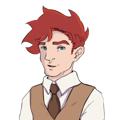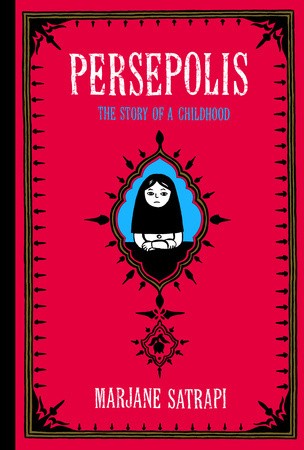Review of 'Persepolis: The Story of a Childhood (Persepolis #1-2)' on 'Goodreads'
4 stars
Warning: This review goes in a couple weird directions. Read at your own peril!
Coming back to this book after several years, and a recent read through of all of the Satrapi books at my library, I was rather struck by the unique position it holds in Satrapi's bibliography. While it is certainly worthy of the position, it has become very obvious to me why this book is her most popular. Perhaps I am being too jaded, but I suspect a lot of it has to do with sexism. For who can resist the story of a sexually innocent little girl? That overly simplified bit of paranoia behind us however, let us get down to reviewing the book itself.
Despite this being perhaps on of the easiest most appealing ways to tell the story of the cultural revolution in Iran to westerners, this book really is excellent. This is not to be confused with endorsing this book as the be all end all of everything anyone should ever read on the subject (as some negative reviewers seem to insinuate), but it was an easy entry point for me, and I suspect it does the same thing for many people.
When I first read this book college around 2010 I think it's fair to say that this book changed my life. Not all at once certainly - but looking back anyway, I can't recall any earlier point where anything made a genuine effort to have me see people in the Middle East as peers and not either exotic other or evil incarnate. So, really, I am very glad that this book is so popular. As a first person nonfiction experience from a place so often maligned by American media, love it or hate it, this is an important read.
Of course, disclaimer, another really appealing part of this book for me was the way it explains history through personal narrative. Some people learn better from lists of facts that clearly outline every minute detail history, and some people learn best from long rambly narratives that tie everything together with stories and abstract concepts. That said, most people fall somewhere in the middle. Having read one too many negative reviews on historical narratives that I find educational, I would like to point out that both of these ways of learning IMHO are equally valid.
While "Factual" people would like to argue that a lot of the more narrative and personal approaches to history are biased, I would argue that even supposedly objective lists of facts are almost never devoid of all bias. Therefor, having people present their biases more openly actually leads to a much more balanced overall education, then if you have to spend a large amount of time parsing out the inevitable bias of so called facts. People can come up with facts to back up pretty much anything and do a really good job of obscuring just how unfactual their facts really are.
Persepolis, on the other hand, spends a great deal of time unpacking Satrapi's entire world view. Putting much of her early life, good and bad, serious and silly, on full display. Therefor it is much easier for people to realize the limitations, both accidental and diabolically purposeful, of the narrative.
For one thing, while she is very personally spiritual, Satrapi family does not seem to be anything more than culturally Islamic. So I should probably find some stories about actual Muslims people, either inside or outside Iran, to get a better idea about the religion itself rather than just the politics of this one Islamic state. For another, particularly in this first volume, Satrapi is very pro-west.
Going from Embroideries to Persepolis 1 I was also struck by how much simpler the art is in this earlier volume. While it does make it a bit harder to differentiate between people, it also reflects her simpler understanding of things as a child. The dramatic and highly contrasted style does a very good job of reflecting the austere and violent times that Satrapi has lived through without getting overly gruesome. I really appreciated how Satrapi worked to make this as all ages as she could have.
Reading through all the Satrapi graphic novels (plus movie) that I could this month, I really did enjoy coming back to the root of it all in the end. Reading about Marjane's childhood is vital to understanding her work overall and is the conception of many of the things that I find so interesting about her which I will probably explain in more depth in another review/video.

